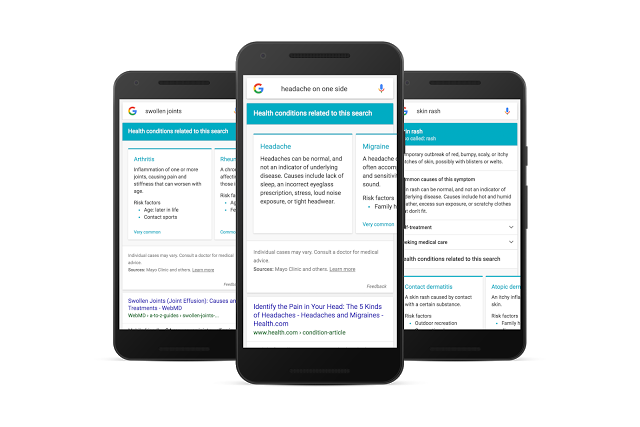
Who hasn’t turned to Google when they have a strange stomach pain or inexplicable headache? Chances are that the online search for answers usually ends in a stressful panic that your splitting headache means a turn for the worse is coming your way – health forums tend to over-exaggerate simple ailments. About 1% of Google searches are symptom-related, often providing curious users with excessive information that includes unlikely and rare health scenarios. A great concern among users is that, in case of a true medical concern, helpful and credible answers would not be easily found.
A redesign of the Google app’s symptoms search results will hopefully ease your anxiety. Following the latest update, searching symptoms such as “headache on one side” will result in a list of related conditions and present all possible options in an easy-to-read format. Searching more general indicators such as “headache” will provide an overall description of the symptom as well as self-treatment tips and what should persuade you to visit a doctor. “By doing this, our goal is to help you to navigate and explore health conditions related to your symptoms, and quickly get to the point where you can do more in-depth research on the web or talk to a health professional,” writes Google project manager Veronica Pinchin in a blog post.
Many of the medical searches on the app will come with a condition card, which Google launched in February 2015. The cards pop up at the top of any symptom search, providing relevant medical facts from the Knowledge Graph, Google’s chart of “real-world things and their connections.” The condition card may also provide a high-quality illustration from licensed medical illustrators. All of the medical facts presented are actual clinical knowledge from medical doctors, including Google’s Dr. Kapil Parakh, M.D., MPH, Ph.D. Experts at Harvard Medical School and Mayo Clinic also viewed the medical conditions to help improve the lists of results.
Google will be incorporating the symptom search cards into its app first in English and in the United States, working with iOS and Android apps for now. The new cards will also appear in search results on mobile phones and tablets. Additions to desktop browsers and more languages will occur in the future.
Source: Ars Technica, Google Blog, Google Blog 2, Google, The Verge
Advertisement
Learn more about Electronic Products Magazine





